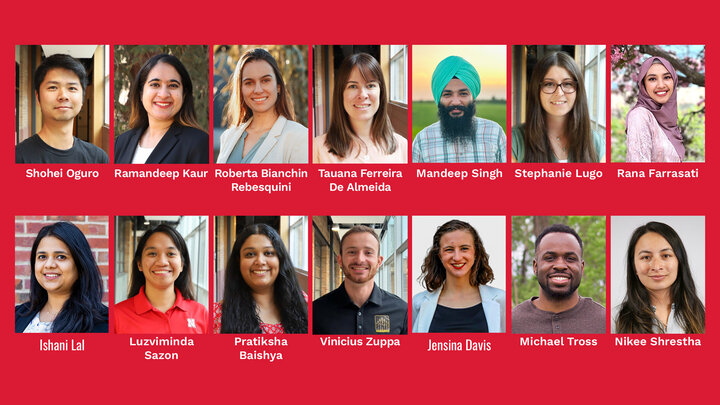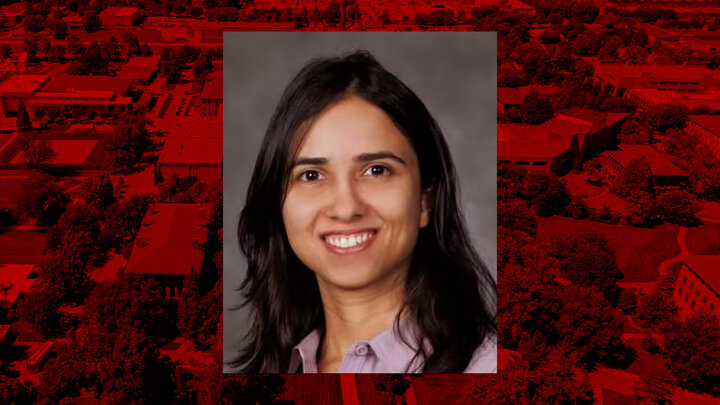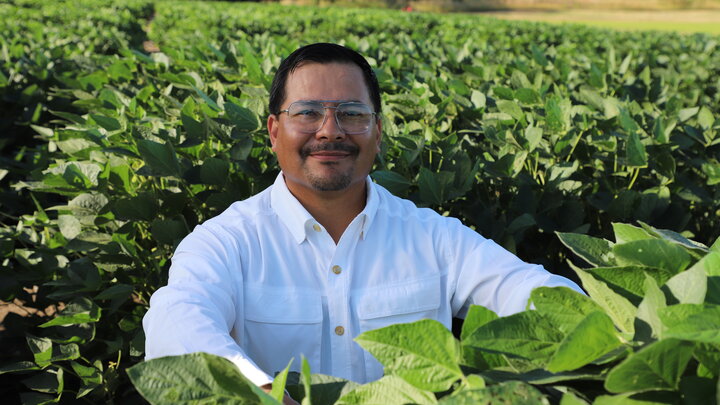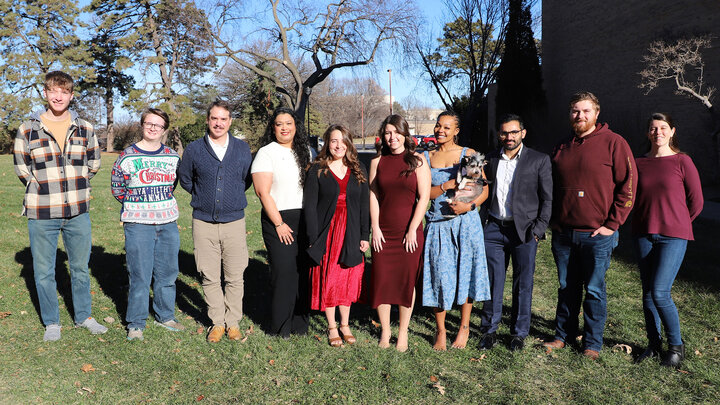Fourteen Department of Agronomy and Horticulture graduate students were honored with awards and fellowships from the Agricultural Research Division, College of Agricultural Sciences and Natural Resources, Office of Graduate Studies, Water for Food, and the North Central Sustainable Agriculture Research and Education.
Shohei Oguro received the Hardin Distinguished Graduate Fellowship. This fellowship is awarded to outstanding graduate students and supports research in plant physiology with particular emphasis on genetic mechanisms influencing plant responses to stress conditions.
Oguro is a master’s student specializing in plant breeding and genetics. His research focuses on exploring the physiological and molecular responses to high temperature stress during panicle and seed developmental stages in rice. He is advised by agronomy and horticulture professor Harkamal Walia.
Ramandeep Kaur and Roberta Bianchin Rebesquini received the John and Louise Skala Fellowship. This award recognizes exceptional graduate students engaged in research in areas relating to new industrial uses of agricultural products.
Kaur is a doctoral student specializing in weed science. Her research focuses on the management of Atrazine, Glyphosate and ALS-inhibiting Herbicide-resistant Palmer amaranth in herbicide-resistant and food grade corn. She is advised by Amit Jhala, agronomy and horticulture professor and associate department head.
Rebesquini, master’s student specializing in cropping systems, is advised by Andrea Basche, agronomy and horticulture associate professor. Her research focuses on evaluating the management and production of Kernza®️, a perennial grain crop developed by The Land Institute.
Tauana Ferreira de Almeida received the Shear-Miles Agricultural Fellowship. This award is given to students with high scholastic merit and research potential in basic agriculture and are conducting either basic or applied research in agriculture.
Ferreira de Almeida is a doctoral student advised by Basche. She leads Basche’s team in participation in the Precision Sustainable Agriculture Coordinated Agriculture Project. Her research focuses on the efficiency of cover crops under different management systems to improve soil health, control weeds and pests and increase cash crop yield.
Rana Farrasati, Ishani Lal, Luzviminda Sazon and Nikee Shrestha received the Widaman Distinguished Graduate Assistant Award. This award is for graduate students with high scholastic merit and research potential conducting basic research in agriculture.
Farrasati is a master’s student specializing in soil and water science. She is advised by Sunkist Distinguished Professor of Agronomy Patricio Grassini. Her research involves building a one-stop-hub, user-friendly, scientific-based and robust decision-support tool to support proper nutrient management for oil palm farmers. The tools work as a site-specific fertilizer recommendation application with best management practices suggestions based on a farmer's field information. The helpful features of the tools are fertilizer recommendations based on 4R, fertilizer cost, a dashboard of their field progress, and educational notes that support best and sustainable management practices.
Farrasati also received the Water for Food Global Conference Poster Competition People’s Choice Award.
Lal is a double master’s student in agronomy and agricultural economics. She is advised by Haishun Yang, agronomy and horticulture associate professor, and Nick Brozović, professor of agricultural economics. Lal’s research focuses on developing and analyzing the decision-making model for irrigation-as-a-service for smallholder farmers to find the optimal strategy to provide occasional and mobile irrigation service across multiple possible fields when there are constraints that prevent all fields from being irrigated fully. She uses analytical and simulation methods for solving the objective functions of yield and profit maximization.
Lal also received the University of Nebraska–Lincoln Office of Graduate Studies Dean's Fellowship.
Luzviminda Sazon, doctoral student specializing in crop physiology and production, is advised by agronomy and horticulture assistant professor Nicolas Cafaro La Menza and Grassini. Sazon’s research focuses on understanding soybean response to nitrogen application to provide a basis for soybean nitrogen recommendation.
Nikee Shrestha, doctoral student in Complex Biosystems Integrated Plant Biology, is advised by agronomy and horticulture professor James Schnable. Shrestha leads the efforts of the Schnable Lab as part of the USDA and NSF supported AI Institute for Resilient Agriculture using satellite imagery to track the growth and stress of corn hybrids from the Mississippi river to the Nebraska/Wyoming board and quantitative genetics to identify genes that help sorghum use light for photosynthesis more efficiently.
Michael Tross, doctoral student in Complex Biosystems – Integrated Plant Biology, received the Life Sciences Fellowship. This fellowship is in recognition of outstanding performance as a graduate student in the scientific study of living organisms and life processes. His research focuses on using artificial intelligence and neural networks to interpret complex sensor datasets and identify genes in corn and sorghum controlled natural variation in plant traits. Tross is advised by Schnable.
Jensina Davis, doctoral student in Complex Biosystems – Integrated Plant Biology, received the Moseman Fellowship. This award is for graduate students with interests in international agriculture and world food development with an emphasis on plant breeding and genetics. Her research focuses on advancing sustainability in agriculture using computational and statistical research methods. She is advised by Schnable.
Pratiksha Baishya received the Farmers National Fellowship. This fellowship is awarded to full-time graduate students with preference to students who have expressed a desire to pursue a career in the area of farm management following graduation.
Baishya is a doctoral student specializing in crop production and physiology and minoring in agricultural economics. She is advised by agronomy and horticulture professor Dipak Santra and Cory Walters, associate professor of agricultural economics. Her research focuses on the production and promotion of proso millet as a climate-resilient summer cereal crop among producers and consumers in the US High Plains region.
Mandeep Singh, doctoral student specializing in weed science, received the Milton Mohr Fellowship. This fellowship recognizes exceptional graduate students based on academic and scholastic achievement or promise.
Singh’s research focuses on gene flow, evapotranspiration and management of herbicide-resistant corn volunteers in corn. His is advised by Amit Jhala, agronomy and horticulture associate department head, professor and extension weed management specialist.
Stephanie Lugo, master’s student specializing in soil and water, received a Chancellor’s Fellowship. This fellowship awards incoming master’s students with excellent academic records and recommendations in whom their faculty advisor along with the Graduate Committee feel holds tremendous promise.
Lugo’s research focuses on conducting a post-fire soil health assessment for the Nebraska National Forest at Halsey ecosystems to see how the Bovee Fire in October 2022 impacts biological, chemical and physical soil health indicators in different ecosystems. The ecosystems Lugo will be investigating include native grasslands; dense, closed-canopy ponderosa pine; and eastern redcedar forests. Her goal is to create adaptive management practices in the aftermath of catastrophic, severe wildfires. Lugo is advised by Caro Córdova, agronomy and horticulture assistant professor and statewide soil health specialist.
Vinicius Zuppa, crop physiology and production doctoral student specializing in dryland cropping systems, received the North Central Region Sustainable Agriculture Research and Education Graduate Student Grant. This grant supports projects by graduate students that address sustainable agriculture issues in the North Central Region and are part of the student’s degree program.
Zuppa’s research focuses on quantifying the infestation levels of different wheat varieties across western Nebraska, providing essential data for understanding and addressing the wheat stem sawfly problem in the region. A crucial aspect of the project involves developing integrated strategies to mitigate the impacts of the wheat stem sawfly comprehensively, with a broader goal of evaluating the impact of it on the cropping systems across the high and central Plains, encompassing states such as North Dakota, South Dakota, Wyoming, Colorado and Kansas. Zuppa is advised by Cody Creech, agronomy and horticulture associate professor.




